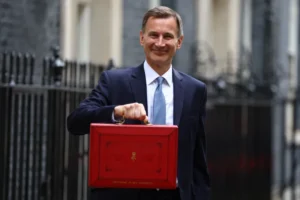Tens of thousands of workers who are angry with the government went on strike, demanding better working conditions and wages that would allow them to manage a deepening cost-of-living problem, and UK finance minister Jeremy Hunt praised his strategy aimed at accelerating a stalling economy.
Hunt presented his budget to parliament on Wednesday to jeers from the opposition Labour Party, which is doing well in polls ahead of an election that is anticipated for next year. Hunt unveiled childcare and tax reforms to encourage more people to find employment as well as corporate tax breaks to boost low levels of business investment.
Hunt added that he would freeze the fuel tax and provide assistance to homes struggling with skyrocketing energy costs.
The sixth-largest economy in the world is now anticipated to avoid a recession this year, even if it is still forecast to decrease, according to the chancellor of the Exchequer.
Hunt said, “I report today on a British economy that is disproving the naysayers in the face of great hurdles.
“In the autumn, we made painful decisions to bring stability and sound money,” said Hunt, who was hurriedly appointed to lead the Treasury in October and reverse the tax-cutting initiatives that had caused havoc on the financial markets during Liz Truss’s brief premiership.
“Debt servicing costs are down, mortgage rates are down, and inflation has peaked since mid-October,” he told lawmakers in parliament. The UK economy is moving in the right direction, according to the International Monetary Fund, thanks to our strategy.
The UK economy is the only one of the Group of Seven countries that has not yet recovered to its pre-pandemic size after the shocks of Brexit, COVID-19, and double-digit inflation, having previously endured a decade of nearly stagnant income growth.
Hunt and Prime Minister Rishi Sunak rejected requests from some Conservative Party legislators for significant tax cuts, focusing instead on debt regulations introduced in the latter part of last year to calm the roiling bond markets in the UK.
Hunt, though, managed to raise enough cash to extend the government’s subsidies for home energy bills by an additional three months and the decade-long freeze on fuel duty by an additional year.
In addition, he unveiled a new incentive for business investment that will let businesses deduct all of their capital expenditures from profits, even if it represented a reduction in tax incentives under a former two-year plan.
More nuclear power investment was one of the other measures.
Hunt announced that over the next five years, the government would increase the defense budget by 11 billion pounds ($13.3 billion), which has been burdened by Britain’s assistance to Ukraine in its conflict with Russia.
From Leamington Spa in the English Midlands, Al Jazeera’s Jonah Hull reported that families and companies were “calling out for help across the country” at the time the new budget was released.
The focus of this budget, he stated, is on stabilizing the public finances and reestablishing public confidence in the government.
Britain has seen a substantial increase in industrial action over the past few months as public ire has escalated.
Thousands of employees, including teachers, physicians, bus drivers, and other professionals, once again skipped work on Wednesday to protest for equal pay and working conditions.
Younger doctors are merely requesting to be “given a wage that matches our skill set,” according to Rebecca Lissman, 29, an obstetrics and gynecology trainee.
I want to work, take care of others, and receive training, she declared. Although I don’t want to be here striking, I feel compelled to.
Leah Sugarman, 33, joined other strikers outside St Thomas’ Hospital in central London as they chanted, “What do we want? A fair wage! How soon do we need it? Now!”
The emergency medicine physician, who has been working for nine years, claimed she finds it difficult to maintain a regular lifestyle and cannot afford a mortgage.
“We’ve all experienced COVID; it was terrible. Most of us have suffered mental scars as a result, she claimed. And every time I leave work, I almost want to cry because I feel like I haven’t been able to fulfill the purpose for why I entered this line of work.
She continued, “I can’t psychologically go to work full time anymore,” so I’ve had to cut back to less than 40 hours a week.
She remarked, “It’s just a car crash. That being the case, I’m here.
The independent Office for Budget Responsibility’s November projection of a 1.4 percent decline in the gross domestic product in 2023 was revised downward to a 0.2 percent decline (OBR).
Since then, energy prices, which increased as a result of Russia’s invasion of Ukraine, have decreased, and some economic figures have shown indications of improvement.

The UK will not now enter a technical recession this year, according to the Office for Budget Responsibility’s forecast released today and the measures I take, Hunt said.
According to Hunt, the OBR revised its prior predictions for economic growth from 1.3 percent to 2.5 percent, respectively, to 1.8 percent in 2024 and 2.5 percent in 2025.
Hunt stated, “Despite ongoing global unrest, today’s OBR study indicates that inflation in the UK will decline from 10.7% in the fourth quarter of last year to 2.9 percent by the end of 2023.
Although many economists believe Hunt is likely saving some fiscal wrath for closer to the next presidential election, Wednesday’s estimates highlighted the government’s future options as being limited.
They demonstrated that Hunt’s target of reducing the UK’s 2.5 trillion pound ($3 billion) debt as a percentage of GDP within five years was on track to be achieved with just a 6.5 billion pound ($7.85 billion) buffer.




